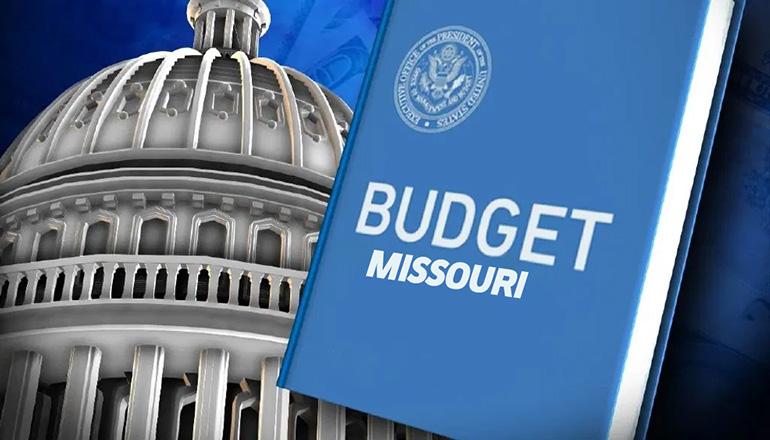(Missouri Independent) – Missouri Gov. Mike Parson’s budget vetoes weren’t necessary to protect state finances and could lead to overrides when lawmakers meet in September, Republican legislative budget leaders said Wednesday.
While overrides, both for budget items and other legislation, became common when Democratic Gov. Jay Nixon was in office, a governor has only been overridden twice in modern state history when the same party controls the legislative and executive branches.
That could change in September after Parson on Friday vetoed 201 spending items, totaling $555 million, included in the budget approved by lawmakers in May. Each of the 68 vetoes Parson issued on a capital construction bill packed with local spending items included a statement that he was acting “to help ensure the financial stability of Missouri beyond my administration and the current General Assembly.”
That is not correct, House Budget Committee Chairman Cody Smith told The Independent.
“I do appreciate the sentiment and that he’s concerned about the overall bigger picture, but I disagree that this is causing a problem,” said Smith, a Republican from Carthage.
The state ended the fiscal year Friday with about $7.8 billion in surplus funds, including $5.7 billion of general revenue. General revenue beat expectations for the year at $13.2 billion and the budget approved by lawmakers uses just under $16 billion before vetoes. Parson vetoed $365 million in general revenue spending.
Funding for infrastructure and public safety projects sought by lawmakers and communities will be priorities in discussions, already underway, about the vetoes, Smith said.
“I would look there first to talk about potential overrides,” he said.
The Missouri House voted to override four of Parson’s line-item budget vetoes during the 2022 veto session but a badly divided Senate did not agree on any of them. Because budget bills start in the House, only overrides that are successful in that chamber can be considered in the Senate.
“There’s definitely conversations going on” about possible overrides, said Senate Appropriations Committee Chairman Lincoln Hough, R-Springfield .
He’s been fielding calls from fellow lawmakers, community leaders and program advocates asking about Parson’s actions, Hough said.
“There’s plenty of people out there who are frustrated and or disappointed, but the thing that I would say is there’s an awful lot of good stuff in the budget even after the governor went through his vetoes,” Hough said.
Parson’s actions left several very large items added by lawmakers untouched. He signed onto Hough’s proposal to spend $2.8 billion, including $1.4 billion general revenue, to widen Interstate 70 after proposing a partial plan with a cost of $859 million.
Parson also agreed with plans to spend $300 million for a new state psychiatric hospital in Kansas City, $171 million to boost pay for direct care workers in residential programs and $100 million added in the House for work on low-volume rural roads.
Hough said the vetoes were not necessary for the state to maintain a healthy fund balance or uphold its bond rating – a reason also repeatedly cited by Parson.
“It was about this time last year I was driving back and forth to Jeff City, it seemed like every other week, to have meetings on the largest tax cut in the history of the state,” Hough said.
The bill passed last year, which accelerated and expanded earlier cuts, cut the top tax rate from 5.3% to 4.95% with an additional cut coming on Jan. 1 to 4.8%.
“We passed a fully implemented, billion-dollar income tax cut,” Hough said. “And now we’ve got the governor saying, ‘we’ve got to watch out for the future.’”
Parson cut almost every item lawmakers added to the construction budget and dozens of items throughout the operating appropriations. The initial reactions from lawmakers on social media included anger and frustration.
Republican Sen. Nick Schroer accused Parson of “effectively defunding the police in O’Fallon by vetoing an incredibly important and vital training center to be used by police across our state.”
The appropriation for $12 million required a 50% local match. In addition to citing the state’s financial needs, Parson’s veto declared the entire project a local responsibility.
Schroer was also upset Parson vetoed $5 million for a no-interest loan to St. Charles for drinking water infrastructure improvements.
“The St. Charles County delegation worked their ass off for our people just to be vetoed by someone who couldn’t pick up a phone, email, text, write a letter, or send a Harry Potter carrier owl,” Schroer wrote on his Twitter account.
State Rep. Louis Riggs, R-Hannibal, tweeted a photo of an auto crash snarling traffic in his hometown as evidence of why the earmark he sought was needed.
Along with state finances, calling projects a local responsibility was a “recurring theme” in the vetoes, Smith said. He will be looking for “intellectual consistency across the state budget” to determine if he agrees, he said.
State revenues are expected to grow at a very slow rate during the fiscal year and there is a tax cut that would reduce revenue by about $300 million annually on Parson’s desk. Neither is a reason to cut so deeply into the legislative earmarked spending, Hough said.
“Maybe the governor’s concerned about what possible further tax reductions that the legislature may be looking at,” he said, “but that’s not necessarily how you build this budget.”


